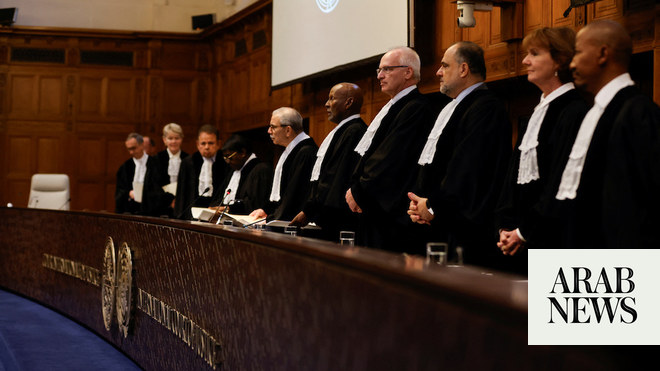
The Second World War was not even over when the UN Charter was written. The conference that opened in San Francisco in April 1945 was where the Charter was created and formally signed by the 50 participating nations. Now, three-quarters of a century later, the UN is a body of 193 members. Its founding aim was to “save succeeding generations from the scourge of war” — a mighty ambition, coming after two global conflicts had destroyed generations across the planet.
How has this body fared? Has it achieved the lofty aims of its progenitors, or even got close? Was this too naive an ambition?
It is easy to carp and pass judgment. Countless conflicts have ensued, with terrible consequences, some within just a few years of that San Francisco gathering, like the Korean War. Yet, for all the tensions and rivalries, not least during the Cold War era, a third world war has yet to erupt. And those few occasions that did take us to the brink — such as the Cuban Missile Crisis — were largely a result of accident and miscalculation, rather than any serious desire for world domination.
The UN should take credit for its role in evading a third world war thus far. Back at the height of the Cold War, the Security Council was frequently the forum where fevered tensions were calmed. The US and Soviet Union could deploy the veto to cancel each other out diplomatically, but also use it for face-saving purposes.
This hardly gets pulses racing in the peace-making fraternity, but it should not be downplayed. It must not be forgotten and cast aside as one rips apart the organization’s inglorious failings. One must also be candid about expectations of keeping peace across the world when so many conflict fault lines, historical grievances and ancient antipathies prevail.
The other cautionary point is that any such body is only ever as effective as its members allow it to be. Rifts and division paralyze the UN, as we witness today over Syria and Libya. The vetoes of the permanent five members of the Security Council can be viewed as a necessary evil to keep the UN from breaking up. These nations have protected their separate interests but also their allies from censure or action. All too frequently, critics claim that the UN failed over, say, Palestine or Iraq, when really it is individual states to blame.
The credit column must also include the phenomenal aid, relief and development efforts. Many UN agencies operate in the harshest of circumstances, saving the lives of millions. Is it always sound value for money? No, frequently not, but agencies such as UNICEF, the UN Development Program, and the UN High Commissioner for Refugees are irreplaceable in delivering aid at scale. Often they succeed despite the UN’s bureaucracy and the bickering and interference of its members.
Not all UN agencies have hit the heights. The UN Human Rights Council is not fit for purpose. Member states are hardly going to be impartial judges and juries on their own behavior. Accountability in international relations remains weak to nonexistent, with the International Criminal Court (ICC) chastised for having only indicted African figures in its short history. Many will wait to see if the ICC dares to probe Israelis for war crimes.
Palestine has to rank as one of the UN’s greatest failures. The UN General Assembly (UNGA) gave birth to the state of Israel with the 1947 UNGA 181, the partition resolution. More than seven decades later, the UN has yet to welcome the state of Palestine as a full member. The US, in particular, has, since 1967, gone to extraordinary lengths to shield Israel from legitimate charges of war crimes. But have the other nations done enough to counter this?
Other notable failures include Rwanda and Darfur. Many are rightly still haunted by the failure of the UN and other parties to do anything to prevent these genocides. They are a stain on the UN’s record that cannot be wiped away.
The UN has suffered its fair share of humiliations, but perhaps none worse than during the wars that saw the breakup of the former Yugoslavia. In 1995, Bosnian Serbs held 400 UN observers hostage and used them as human shields. Even though Srebrenica was declared a UN safe zone, 7,000 men and boys were massacred in just a few days under the noses of UN peacemakers.
One would like to think that this anniversary will spark a serious effort to renew and reform this great body. It will not happen. Past efforts have withered away. The permanent members are not going to give up their veto or risk diluting this golden power by offering it out to too many other states. Increasingly, the UN risks becoming an irrelevance as rival actors ignore international law and diplomacy in their nakedly raw quest for supremacy. Can the UN also handle the mega-threats of our age? Transnational terrorism and organized crime have proved too much. One can only hope that the UN can bring nations together to address climate change, but who would bet on it?
One would like to think that this anniversary will spark a serious effort to renew and reform this great body.
Chris Doyle
The UN also needs to address perhaps its greatest failing. The UN Charter itself memorably starts with, “We the peoples of the United Nations…” This remains a manifest falsehood. The peoples of the UN do not have a say. This is a body of states, whose leaders take the decisions. It serves their interests, not the people"s and, in particular, those of the major powers. It is not remotely democratic, neither are many of its members.
Herein lies the challenge. How, over the next quarter of a century, can the behemoth of the UN metamorphose into a body relevant to the challenges of the times and in touch with the peoples of each continent? Many might ask whether it can adapt at all. But, if it wants to survive, it surely has to.
Chris Doyle is director of the London-based Council for Arab-British Understanding. Twitter: @Doylech
Disclaimer: Views expressed by writers in this section are their own and do not necessarily reflect Arab News" point-of-view












